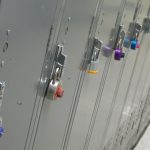

This brief describes the prevalence of food insecurity among SDP households that responded to the District-Wide Survey in 2019-20 and examines the differences in food insecurity rates across different student subgroups and schools.

This series of reports compares performance in reading and math assessments for the same set of students over time. The main metric used in the reports is the National Percentile Rank (NPR). NPR is a norm-referenced measure that compares student performance to a national sample of students.

This brief summarizes the performance of students who received support from a Reading Specialist before the transition to digital learning and support, from October 2019 (fall) to February 2020 (winter).

Results from an annual survey designed to identify the number and nature of external supports in place at each SDP school. This report summarizes District-level findings from the fourth administration of the Census.

This brief summarizes findings from a study of the “summer melt” rates of the cohort of college-intending 2020 School District of Philadelphia (SDP) seniors.

The District uses aimswebPlus assessments to monitor K-3 math progress on the Leading Indicators. This brief explores two research questions to better understand K-3 aimswebPlus student performance

This brief explores 2020-21 student enrollment patterns at District, Alternative, Charter, and Cyber Charter schools in Philadelphia, including by school admission type and student demographics, as well as changes in those patterns over time.

In Spring 2021 the Office of Research and Evaluation (ORE) surveyed School District of Philadelphia (SDP) stakeholders about what supports should be prioritized in the budget for the 2021-22 school year. This slide deck provides an overview of feedback and responses.

An evaluation of the implementation and impact of the Literacy and Learning Centers project.